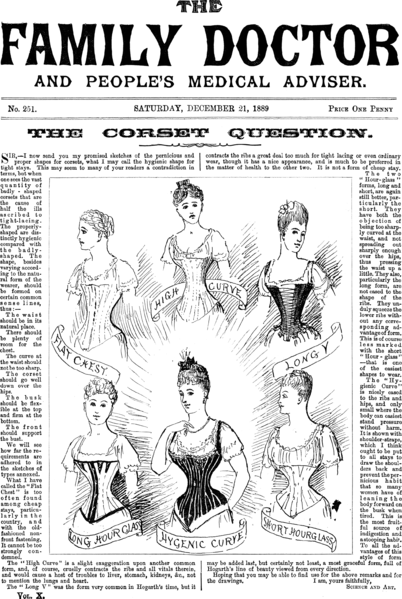File:TheFamilyDoctorDec21 1889page255.png

Original file (2,062 × 3,072 pixels, file size: 632 KB, MIME type: image/png)
| This is a file from the Wikimedia Commons. Information from its description page there is shown below. Commons is a freely licensed media file repository. You can help. |
Summary
Image:TheFamilyDoctorDec21_1889page255cut.png
THE
FAMILY DOCTOR
AND PEOPLE'S MEDICAL ADVISER.
No. 251. SATURDAY, DECEMBER 21, 1889 PRICE ONE PENNY
THE CORSET QUESTION.
SIR,--I now send you my promised sketches of the pernicious and proper shapes for corsets, what I may call the hygienic shape for tight stays. This may seem to many of your readers a contradiction in terms, but when one sees the vast quantity of badly - shaped corsets that are the cause of half the ills ascribed to tight-lacing. The properly-shaped are distinctly hygienic compared with the badlyshaped. The shape, besides varying according to the natural form of the wearer, should be formed on certain common sense lines, thus :--
The waist should be in ita natural place.
There should be plenty of room for the chest.
The curve at the waist should not be too sharp.
The corset should go well down over the hips.
The busk should be flexible at the top and firm at the bottom.
The front should support the bust.
We will see how far the requirements are adhered to in the sketches of types annexed.
What I have called the "Flat Chest" is too often found among cheap stays, particularly in the country, and with the old fashioned non-front fastening. It cannot be too strongly condemned.
The " High Curve" is a slight exaggeration upon another common form, and, of course, cruelly contracts the ribs and all vitals therein, and would cause a host of troubles to liver, stomach, kidneys, &c., not to mention the lungs and heart.
The " Long V" was the form very common in Hogarth's time, but it contracts the ribs a great deal too much for tight lacing or even ordinary wear, though it has a nice appearance, and is much to be preferred in the matter of health to the other two. It is not a form of cheap stay.
The two "Hour-glass" forms, long and short, are again still better, particularly the short. They have both the objection of being too sharply curved at the waist, and not spreading out sharply enough over the hips, thus pressing the waist up a little. They also, particularly the long form, are not eased to the shape of the ribs. They unduly squeeze the lower ribs without any corresponding advantage of form.
This is of course less marked with the short "Hour-glass" --that is one of the easiest shapes to wear. The "Hygienic Curve" is nicely eased to the ribs and hips, and only small where the body can easiest stand pressure without harm. It is shown with shoulder-straps, which I think ought to be put to all stays to draw the shoulders back and prevent the pernicious hahit that so many women have of leaning the body forward on the busk when tired. This is the most fruitful source of indigestion and a stooping habit. To all the advantages of this style of form may be added last, but certainly not least, a most graceful form, full of Hogarth's line of beauty viewed from every direction.
Hoping that you may be able to find use for the above remarks and for the drawings.
I am, yours faithfully,
SCIENCE AND ART,
VOL. X.
from Science and Art.
Licensing
|
This is a faithful photographic reproduction of a two-dimensional, public domain work of art. The work of art itself is in the public domain for the following reason:
The official position taken by the Wikimedia Foundation is that "faithful reproductions of two-dimensional public domain works of art are public domain". This photographic reproduction is therefore also considered to be in the public domain in the United States. In other jurisdictions, re-use of this content may be restricted; see Reuse of PD-Art photographs for details. {{PD-Art}} template without license parameter: please specify why the underlying work is public domain in both the source country and the United States
(Usage: {{PD-Art|1=|deathyear=''year of author's death''|country=''source country''}}, where parameter 1= can be PD-old-auto, PD-old-auto-expired, PD-old-auto-1996, PD-old-100 or similar. See Commons:Multi-license copyright tags for more information.) | |||||
File history
Click on a date/time to view the file as it appeared at that time.
| Date/Time | Thumbnail | Dimensions | User | Comment | |
|---|---|---|---|---|---|
| current | 14:14, 21 February 2007 |  | 2,062 × 3,072 (632 KB) | Haabet | |
| 21:23, 17 February 2007 |  | 4,433 × 6,604 (1.45 MB) | Haabet | Category:Tightlacing Category:The Family Doctor Category:1889 Category:Woman in corset from Science and Art. |
File usage
The following page uses this file:
